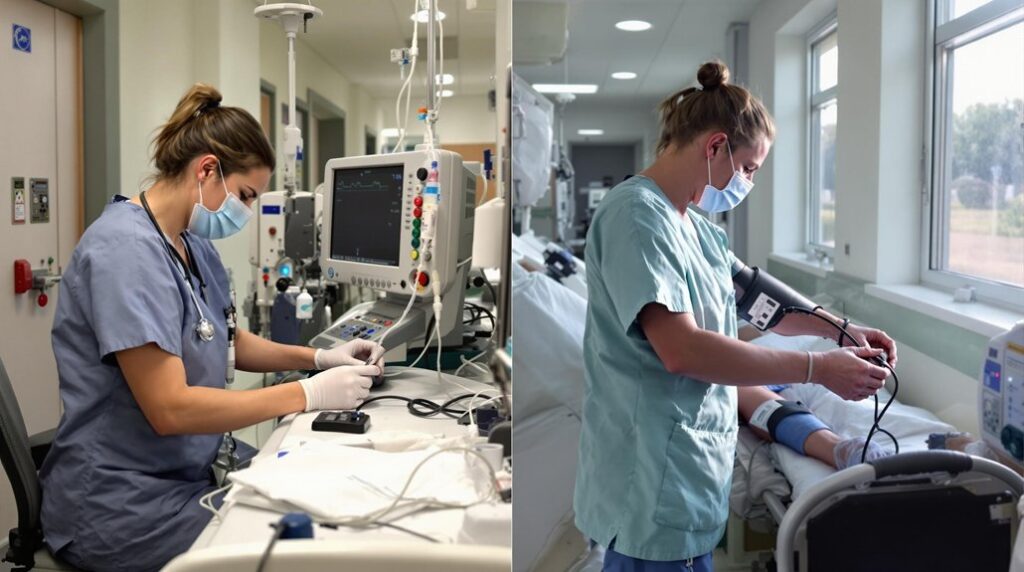Skilled healthcare requires licensed professionals with specialized medical training, like nurses and physicians, who provide complex medical treatments and make critical care decisions. In contrast, you’ll find unskilled healthcare workers focusing on basic daily support tasks like helping with bathing, dressing, and companionship – no medical certification needed. While both types serve essential roles in patient care, their costs and insurance coverage differ greatly. Understanding these distinctions will help you make informed decisions about your healthcare needs.
Defining Skilled Healthcare: Medical Services and Professional Requirements
When you hear the term “skilled healthcare,” it refers to medical services that require specialized training, education, and professional certification. These services are delivered by licensed practitioners like registered nurses, physical therapists, and physicians who’ve completed extensive medical training and passed rigorous examinations.
Skilled healthcare providers perform complex patient assessments and medical interventions that demand clinical expertise and judgment. You’ll find them conducting detailed diagnostic evaluations, developing treatment plans, administering medications, and performing specialized procedures.
They must understand intricate medical conditions and make critical decisions about patient care. To maintain their credentials, skilled healthcare professionals must complete continuing education, stay current with medical advances, and adhere to strict regulatory standards.
Their expertise guarantees patients receive high-quality, evidence-based care that meets established medical protocols.
These professionals provide essential skilled nursing care including wound treatment, IV therapy, and specialized rehabilitation services for homebound patients recovering from surgery or illness.
Understanding Unskilled Healthcare Services and Support
Unlike skilled healthcare services, unskilled healthcare services involve basic, non-medical support that doesn’t require specialized clinical training or licensing. When you provide unskilled assistance, you’ll help patients with their daily living activities and personal care needs.
This type of care focuses on maintaining comfort and supporting basic functions rather than delivering medical treatments.
Common unskilled healthcare services include:
- Helping with bathing, dressing, and personal hygiene
- Assisting with meal preparation and feeding
- Providing companionship and emotional support
- Managing light housekeeping and laundry tasks
While unskilled healthcare doesn’t involve complex medical procedures, it’s crucial for patients’ well-being and quality of life.
You’ll play a significant role in supporting individuals who need help with routine activities, allowing them to maintain their dignity and independence in familiar surroundings.
Memory care services provide specialized support for patients with Alzheimer’s and dementia through structured routines and activities that enhance cognitive function.
Key Differences in Training and Certification Requirements
Training and certification requirements differ markedly between skilled and unskilled healthcare workers. Skilled healthcare providers must complete rigorous training programs and obtain specific certifications, often requiring years of education and clinical experience. For example, nurses follow structured certification pathways including classroom instruction, supervised practice, and licensing exams.
In contrast, you’ll find that unskilled healthcare workers typically need minimal formal training. While you might need a high school diploma and brief on-the-job instruction for roles like home health aide or personal care assistant, these positions don’t require extensive medical education or state licensure.
However, if you’re interested in advancing your career, many certification pathways exist to help you shift from unskilled to skilled healthcare roles through additional training programs and professional development opportunities. Focus Family Care maintains high standards through comprehensive caregiver training programs and quality assurance measures to ensure excellence in home health services.
Insurance Coverage and Medicare Benefits for Both Care Types
The coverage landscape for skilled and unskilled healthcare services varies considerably under different insurance plans and Medicare benefits.
Healthcare coverage options differ greatly between skilled and unskilled services, with each insurance plan offering distinct levels of benefits and support.
You’ll find that most insurance policies provide extensive coverage for skilled care, while unskilled care often requires supplemental coverage or out-of-pocket payments.
- Medicare Part A typically covers skilled nursing care in certified facilities, but only for limited periods following qualifying hospital stays.
- Private insurance options may offer coverage for both skilled and unskilled care, though benefits vary notably by policy type.
- Long-term care insurance policies specifically designed for unskilled care can help bridge coverage gaps.
- Medicare Advantage plans sometimes include additional benefits for unskilled home care services.
When exploring your Medicare options, it’s important to understand the distinctions between coverage types and plan accordingly for both immediate and long-term care needs.
Focus Family Care offers assistance with verifying insurance benefits and submitting claims to help streamline the payment process.
When to Choose Skilled vs. Unskilled Healthcare Services
Making the right choice between skilled and unskilled healthcare services depends heavily on your medical condition’s complexity and required level of expertise. When you’re managing care shifts from hospital to home health, consider these clear distinctions to make informed decisions.
| Medical Situation | Best Care Choice |
|---|---|
| Post-surgery recovery | Skilled nursing |
| Basic daily assistance | Unskilled care |
| Complex wound care | Skilled services |
You’ll need skilled care if you require specialized medical procedures, rehabilitation services, or professional monitoring of essential signs. Choose unskilled care when you need help with routine activities like bathing, meal preparation, or companionship. Remember that your healthcare provider can help evaluate your specific needs and recommend the most appropriate level of care for your situation. Trained caregivers and nurses play a vital role in reducing hospital readmission risks during post-surgery recovery at home.
Cost Comparisons Between Skilled and Unskilled Care
After determining which level of care best suits your needs, understanding the associated costs can help you plan your healthcare budget effectively.
Skilled healthcare typically commands higher rates due to advanced training and specialized expertise, while unskilled care offers greater cost efficiency for basic support services.
- Skilled nursing care can range from $200-500 per day, depending on location and specific medical requirements.
- Unskilled home health aide services average $20-30 per hour with flexible pricing structures.
- Insurance coverage often differs greatly, with Medicare typically covering skilled care but not unskilled services.
- Long-term care costs vary widely, with skilled facilities charging $7,000-10,000 monthly compared to $3,000-5,000 for unskilled assisted living.
When budgeting, consider that combining both types of care strategically can help maximize your healthcare dollars while ensuring appropriate support levels.
The Role of Each Care Type in Recovery and Long-term Health
Healthcare pathways to recovery require careful consideration of both skilled and unskilled care options, as each plays a distinct role in achieving ideal health outcomes.
Skilled care provides specialized medical treatments and rehabilitation that directly impact recovery outcomes through targeted interventions, monitoring, and adjustment of care plans. You’ll find this particularly vital during acute phases of healing.
Unskilled care supports long-term wellness by maintaining daily routines, providing emotional support, and ensuring basic needs are met. While you mightn’t need constant medical expertise, these caregivers help you stay on track with medication schedules, maintain proper nutrition, and keep up with essential activities.
The combination of both care types creates a thorough support system that bridges the gap between immediate medical needs and sustained health improvement.
Evaluating Your Healthcare Needs and Creating a Care Plan
When determining your medical support requirements, it’s vital to conduct a thorough assessment of both immediate and long-term needs. Through a detailed healthcare assessment, you’ll identify which care strategies best support your recovery journey and ongoing wellness.
Develop your personalized care plan by considering these essential factors:
- Your current medical conditions and their severity, including any expected complications or progression
- The level of daily assistance you require, from basic tasks to complex medical procedures
- Your support network’s availability and capabilities to provide care
- Your financial resources and insurance coverage for different care options
Remember to consult healthcare professionals who can guide you in making informed decisions about skilled versus unskilled care services.
Consulting medical experts ensures you select appropriate care services that match your specific health requirements and recovery goals.
They’ll help guarantee your care plan aligns with your medical needs and personal circumstances.
Conclusion
Understanding skilled and unskilled healthcare is like building a complete care team – you need both parts to work together. Think of skilled care as the medical experts who handle complex treatments, while unskilled care provides the daily support that helps you feel comfortable and cared for at home. Just like a warm blanket and medicine both help you feel better when you’re sick, these two types of care work hand-in-hand to support your healing.
You’re not alone in figuring this out. Many families find that mixing both types of care creates the best path to recovery. Picture having both a nurse who manages your medical needs and a caring helper who assists with daily activities – together, they form a circle of support that tends to your whole well-being.
If you or a loved one need help, don’t wait. Reach out to Focus Family Care today at (561) 693-1311 or email us at info@focusfamilycare.com.



